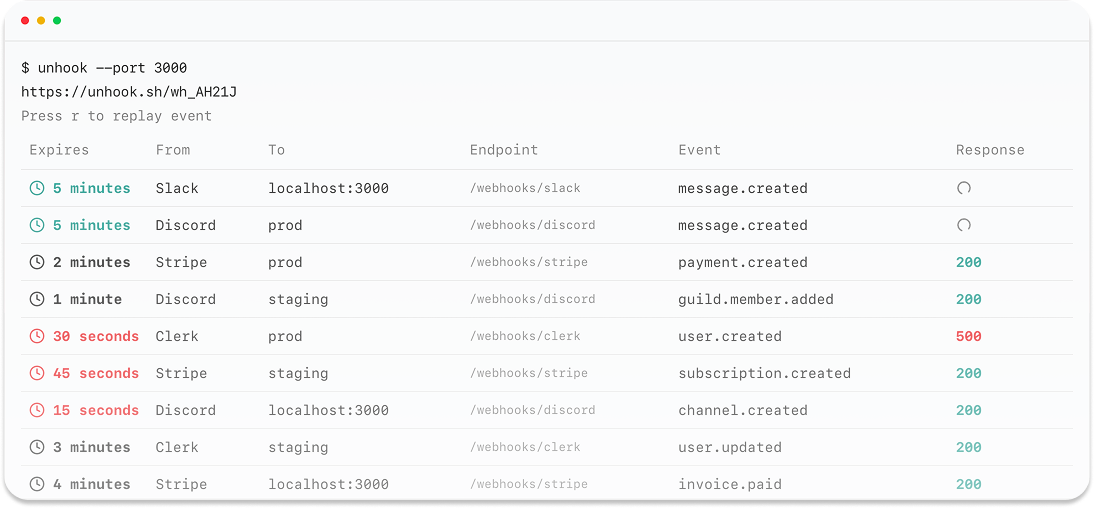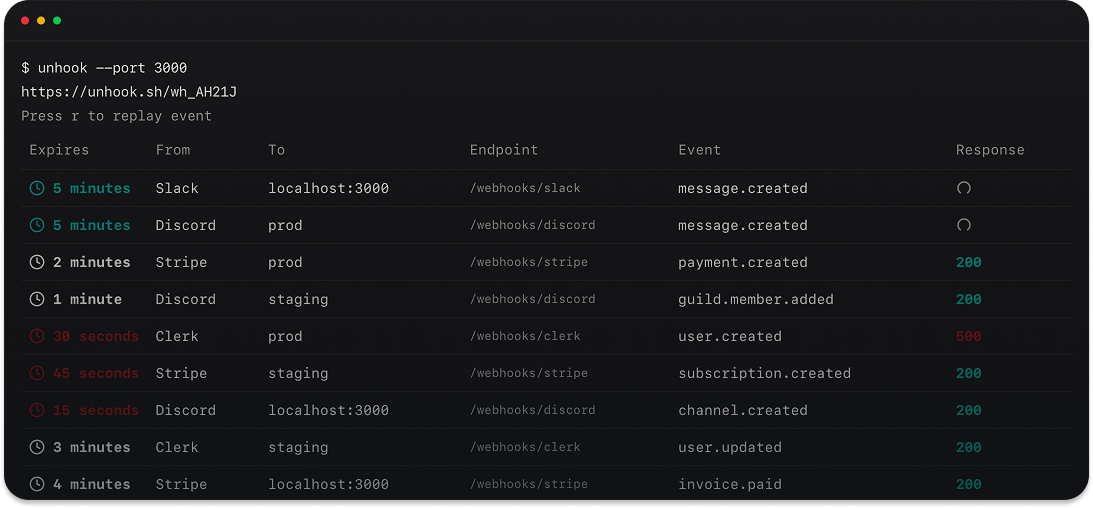

Overview
The Untrace C#/.NET SDK provides zero-latency LLM observability with automatic instrumentation for all major LLM providers. Built on OpenTelemetry standards, it captures comprehensive trace data and routes it to your chosen observability platforms.Quick Start
Start tracing LLM calls in minutes
Framework Support
ASP.NET Core, Console apps, and services
Dependency Injection
Built-in DI support for .NET applications
Examples
Real-world examples and best practices
Installation
Install the Untrace .NET SDK using the .NET CLI:Copy
dotnet add package Untrace.Sdk
Copy
Install-Package Untrace.Sdk
.csproj:
Copy
<PackageReference Include="Untrace.Sdk" Version="0.1.2" />
Quick Start
Basic Setup
Copy
using Untrace;
// Initialize the SDK
var config = new UntraceConfig
{
ApiKey = "your-api-key",
ServiceName = "my-llm-app",
Environment = "production"
};
using var untrace = UntraceSdk.Init(config);
// Create activities for tracing
using var activity = untrace.StartActivity("my-operation");
activity?.SetTag("user.id", "user123");
// Your LLM code is automatically traced!
Legacy Client Usage
Copy
using Untrace;
// Initialize the client
using var client = new UntraceClient("your-api-key");
// Send a trace event
var trace = await client.TraceAsync(
eventType: "llm_call",
data: new Dictionary<string, object>
{
["model"] = "gpt-4",
["prompt"] = "Hello, world!",
["response"] = "Hello! How can I help you today?",
["tokens_used"] = 25
},
metadata: new Dictionary<string, object>
{
["user_id"] = "user123",
["session_id"] = "session456"
}
);
Console.WriteLine($"Trace created: {trace.Id}");
Configuration
Configuration Options
Copy
var config = new UntraceConfig
{
// Required
ApiKey = "your-api-key",
// Optional
BaseUrl = "https://untrace.dev/api", // Custom API endpoint
ServiceName = "untrace-app", // Service name
Environment = "production", // Environment name
Version = "1.0.0", // Service version
Debug = false, // Enable debug logging
DisableAutoInstrumentation = false, // Disable auto-instrumentation
CaptureBody = true, // Capture request/response bodies
CaptureErrors = true, // Capture and report errors
SamplingRate = 1.0, // Sampling rate (0.0 to 1.0)
MaxBatchSize = 512, // Max spans per batch
ExportIntervalMs = 5000, // Export interval in milliseconds
Providers = new List<string> { "all" }, // Providers to instrument
Headers = new Dictionary<string, string>(), // Custom headers
ResourceAttributes = new Dictionary<string, object>() // Additional attributes
};
Environment Variables
The SDK respects these environment variables:Copy
# Core settings
UNTRACE_API_KEY=your-api-key
UNTRACE_BASE_URL=https://untrace.dev/api
UNTRACE_DEBUG=true
# OpenTelemetry settings
OTEL_SERVICE_NAME=my-service
OTEL_RESOURCE_ATTRIBUTES=environment=production,version=1.0.0
Configuration from appsettings.json
Copy
{
"Untrace": {
"ApiKey": "your-api-key",
"ServiceName": "my-app",
"Environment": "production",
"Debug": false,
"SamplingRate": 0.1
}
}
Copy
// In Program.cs or Startup.cs
var config = new UntraceConfig();
configuration.GetSection("Untrace").Bind(config);
Framework Integration
ASP.NET Core
Copy
// Program.cs
using Untrace;
var builder = WebApplication.CreateBuilder(args);
// Add Untrace SDK
builder.Services.AddUntrace(config =>
{
config.ApiKey = builder.Configuration["Untrace:ApiKey"];
config.ServiceName = "my-web-api";
config.Environment = builder.Environment.EnvironmentName;
});
var app = builder.Build();
// Controllers are automatically instrumented
app.MapControllers();
app.Run();
Copy
// Controllers/ChatController.cs
[ApiController]
[Route("api/[controller]")]
public class ChatController : ControllerBase
{
private readonly Untrace _untrace;
public ChatController(Untrace untrace)
{
_untrace = untrace;
}
[HttpPost]
public async Task<IActionResult> Chat([FromBody] ChatRequest request)
{
using var activity = _untrace.StartLLMActivity(
operation: "chat",
provider: "openai",
model: "gpt-3.5-turbo"
);
try
{
// Your LLM logic here
var response = await CallOpenAI(request.Message);
activity?.SetTag("llm.response", response);
return Ok(new { response });
}
catch (Exception ex)
{
_untrace.RecordException(ex);
throw;
}
}
}
Console Applications
Copy
using Untrace;
class Program
{
static async Task Main(string[] args)
{
var config = new UntraceConfig
{
ApiKey = Environment.GetEnvironmentVariable("UNTRACE_API_KEY"),
ServiceName = "console-app",
Environment = "production"
};
using var untrace = UntraceSdk.Init(config);
using var activity = untrace.StartActivity("main-operation");
// Your application logic here
await ProcessData();
activity?.SetTag("status", "completed");
}
}
Background Services
Copy
public class LLMProcessingService : BackgroundService
{
private readonly Untrace _untrace;
private readonly ILogger<LLMProcessingService> _logger;
public LLMProcessingService(Untrace untrace, ILogger<LLMProcessingService> logger)
{
_untrace = untrace;
_logger = logger;
}
protected override async Task ExecuteAsync(CancellationToken stoppingToken)
{
while (!stoppingToken.IsCancellationRequested)
{
using var activity = _untrace.StartActivity("process-queue");
try
{
// Process LLM requests from queue
await ProcessQueueItems();
}
catch (Exception ex)
{
_untrace.RecordException(ex);
_logger.LogError(ex, "Error processing queue");
}
await Task.Delay(1000, stoppingToken);
}
}
}
gRPC Services
Copy
using Grpc.Core;
using Untrace;
public class ChatService : Chat.ChatBase
{
private readonly Untrace _untrace;
public ChatService(Untrace untrace)
{
_untrace = untrace;
}
public override async Task<ChatResponse> SendMessage(
ChatRequest request,
ServerCallContext context)
{
using var activity = _untrace.StartLLMActivity(
operation: "grpc-chat",
provider: "openai",
model: "gpt-4"
);
activity?.SetTag("grpc.method", "SendMessage");
activity?.SetTag("user.id", request.UserId);
try
{
// Your LLM logic here
var response = await ProcessMessage(request.Message);
activity?.SetTag("llm.response", response);
return new ChatResponse { Message = response };
}
catch (Exception ex)
{
_untrace.RecordException(ex);
throw;
}
}
}
Advanced Usage
LLM Activity Tracing
Copy
using var llmActivity = untrace.StartLLMActivity(
operation: "chat",
provider: "openai",
model: "gpt-4",
attributes: new Dictionary<string, object>
{
["llm.prompt"] = "What is the meaning of life?",
["llm.response"] = "42"
}
);
// Record token usage
var tokenUsage = new TokenUsage
{
PromptTokens = 150,
CompletionTokens = 50,
TotalTokens = 200,
Model = "gpt-4",
Provider = "openai"
};
untrace.RecordTokenUsage(tokenUsage);
// Record cost
var cost = new Cost
{
Prompt = 0.0015m,
Completion = 0.002m,
Total = 0.0035m,
Model = "gpt-4",
Provider = "openai"
};
untrace.RecordCost(cost);
Activity Extensions
Copy
using var activity = untrace.StartActivity("my-operation");
// Set LLM attributes
var llmAttributes = new LLMSpanAttributes
{
Provider = "openai",
Model = "gpt-4",
Operation = "chat",
PromptTokens = 100,
CompletionTokens = 50,
TotalTokens = 150,
Cost = 0.003m
};
activity?.SetLLMAttributes(llmAttributes);
// Set workflow attributes
var workflowAttributes = new WorkflowAttributes
{
Id = "workflow-123",
Name = "customer-support",
UserId = "user-456",
SessionId = "session-789",
Metadata = new Dictionary<string, object>
{
["tier"] = "premium",
["region"] = "us-east"
}
};
activity?.SetWorkflowAttributes(workflowAttributes);
Custom Metrics
Copy
// Record custom metrics
untrace.RecordMetric("custom.counter", 1, new Dictionary<string, string>
{
["operation"] = "llm_call",
["model"] = "gpt-4"
});
untrace.RecordHistogram("custom.duration", 1234.5, new Dictionary<string, string>
{
["operation"] = "embedding",
["provider"] = "openai"
});
untrace.RecordGauge("custom.queue_size", 42, new Dictionary<string, string>
{
["queue"] = "processing"
});
Error Handling
Copy
using var activity = untrace.StartActivity("risky-operation");
try
{
// Your risky operation here
throw new InvalidOperationException("Something went wrong");
}
catch (Exception ex)
{
untrace.RecordException(ex);
activity?.SetStatus(ActivityStatusCode.Error, ex.Message);
throw;
}
Dependency Injection
Service Registration
Copy
// In Program.cs or Startup.cs
var builder = WebApplication.CreateBuilder(args);
// Add Untrace SDK with configuration
builder.Services.AddUntrace(config =>
{
config.ApiKey = builder.Configuration["Untrace:ApiKey"];
config.ServiceName = "my-app";
config.Environment = builder.Environment.EnvironmentName;
config.SamplingRate = 0.1;
});
// Or with configuration from appsettings.json
builder.Services.AddUntrace(builder.Configuration.GetSection("Untrace"));
var app = builder.Build();
Service Usage
Copy
public class ChatService
{
private readonly Untrace _untrace;
private readonly UntraceClient _client;
public ChatService(Untrace untrace, UntraceClient client)
{
_untrace = untrace;
_client = client;
}
public async Task<string> ProcessMessage(string message)
{
using var activity = _untrace.StartLLMActivity(
operation: "chat",
provider: "openai",
model: "gpt-4"
);
// Your LLM logic here
return "Generated response";
}
}
Custom Configuration
Copy
public class CustomUntraceConfig : UntraceConfig
{
public string CustomSetting { get; set; }
}
// Register with custom configuration
builder.Services.AddUntrace<CustomUntraceConfig>(config =>
{
config.ApiKey = "your-api-key";
config.CustomSetting = "custom-value";
});
Examples
OpenAI Integration
Copy
using Untrace;
using OpenAI;
public class OpenAIService
{
private readonly Untrace _untrace;
private readonly OpenAIClient _openAI;
public OpenAIService(Untrace untrace, OpenAIClient openAI)
{
_untrace = untrace;
_openAI = openAI;
}
public async Task<string> ChatAsync(string prompt)
{
using var activity = _untrace.StartLLMActivity(
operation: "chat",
provider: "openai",
model: "gpt-4"
);
activity?.SetTag("llm.prompt", prompt);
try
{
var response = await _openAI.ChatCompletions.CreateAsync(
new ChatCompletionCreateRequest
{
Messages = new List<ChatMessage>
{
new ChatMessage(ChatMessageRole.User, prompt)
},
Model = "gpt-4",
MaxTokens = 100,
Temperature = 0.7f
}
);
var content = response.Choices.First().Message.Content;
activity?.SetTag("llm.response", content);
activity?.SetTag("llm.tokens", response.Usage.TotalTokens);
return content;
}
catch (Exception ex)
{
_untrace.RecordException(ex);
activity?.SetStatus(ActivityStatusCode.Error, ex.Message);
throw;
}
}
}
Batch Processing
Copy
public class BatchProcessor
{
private readonly Untrace _untrace;
public BatchProcessor(Untrace untrace)
{
_untrace = untrace;
}
public async Task ProcessBatchAsync(List<string> prompts)
{
using var batchActivity = _untrace.StartActivity("batch-processing");
batchActivity?.SetTag("batch.size", prompts.Count);
var tasks = prompts.Select((prompt, index) =>
ProcessPromptAsync(prompt, index)).ToArray();
await Task.WhenAll(tasks);
}
private async Task ProcessPromptAsync(string prompt, int index)
{
using var activity = _untrace.StartLLMActivity(
operation: "chat",
provider: "openai",
model: "gpt-4"
);
activity?.SetTag("batch.index", index);
activity?.SetTag("llm.prompt", prompt);
try
{
// Process the prompt
var response = await CallLLM(prompt);
activity?.SetTag("llm.response", response);
}
catch (Exception ex)
{
_untrace.RecordException(ex);
activity?.SetStatus(ActivityStatusCode.Error, ex.Message);
}
}
}
Middleware Integration
Copy
public class TracingMiddleware
{
private readonly RequestDelegate _next;
private readonly Untrace _untrace;
public TracingMiddleware(RequestDelegate next, Untrace untrace)
{
_next = next;
_untrace = untrace;
}
public async Task InvokeAsync(HttpContext context)
{
using var activity = _untrace.StartActivity("http-request");
activity?.SetTag("http.method", context.Request.Method);
activity?.SetTag("http.url", context.Request.Path);
activity?.SetTag("http.user_agent", context.Request.Headers.UserAgent);
try
{
await _next(context);
activity?.SetTag("http.status_code", context.Response.StatusCode);
}
catch (Exception ex)
{
_untrace.RecordException(ex);
activity?.SetStatus(ActivityStatusCode.Error, ex.Message);
throw;
}
}
}
// Register middleware
app.UseMiddleware<TracingMiddleware>();
Performance
Sampling
Copy
var config = new UntraceConfig
{
ApiKey = "your-api-key",
SamplingRate = 0.1, // Sample 10% of requests
MaxBatchSize = 100,
ExportIntervalMs = 5000
};
Async Operations
Copy
public async Task<string> ProcessAsync(string input)
{
using var activity = _untrace.StartActivity("process");
// Async operations are properly traced
var result1 = await Step1Async(input);
var result2 = await Step2Async(result1);
var result3 = await Step3Async(result2);
return result3;
}
Best Practices
1. Use Using Statements
Copy
// Good: Automatic disposal
using var activity = untrace.StartActivity("operation");
// Activity is automatically disposed
// Avoid: Manual disposal (easy to forget)
var activity = untrace.StartActivity("operation");
// ... work ...
activity?.Dispose(); // Easy to forget
2. Handle Exceptions Properly
Copy
using var activity = untrace.StartActivity("risky-operation");
try
{
// Your operation here
}
catch (Exception ex)
{
untrace.RecordException(ex);
activity?.SetStatus(ActivityStatusCode.Error, ex.Message);
throw; // Re-throw if needed
}
3. Use Semantic Tags
Copy
activity?.SetTag("user.id", userId);
activity?.SetTag("user.subscription_tier", "premium");
activity?.SetTag("feature.name", "advanced-search");
activity?.SetTag("feature.version", "2.0");
4. Initialize Early
Copy
// Good: Initialize in Program.cs or Main
var builder = WebApplication.CreateBuilder(args);
builder.Services.AddUntrace(config => { /* ... */ });
// Avoid: Initialize in individual methods
public void SomeMethod()
{
var untrace = UntraceSdk.Init(config); // Too late
}
Troubleshooting
Common Issues
No traces appearing
No traces appearing
Copy
// Enable debug mode
var config = new UntraceConfig
{
ApiKey = "your-api-key",
Debug = true
};
// Check console for errors
High latency
High latency
Copy
// Adjust batching settings
var config = new UntraceConfig
{
ApiKey = "your-api-key",
MaxBatchSize = 100,
ExportIntervalMs = 10000
};
Memory usage
Memory usage
Copy
// Use sampling for high-volume applications
var config = new UntraceConfig
{
ApiKey = "your-api-key",
SamplingRate = 0.1
};
DI registration issues
DI registration issues
Copy
// Make sure to register services before building the app
builder.Services.AddUntrace(config => { /* ... */ });
var app = builder.Build(); // Register before this line
API Reference
Core Types
Copy
public class UntraceConfig
{
public string ApiKey { get; set; }
public string BaseUrl { get; set; }
public string ServiceName { get; set; }
public string Environment { get; set; }
public string Version { get; set; }
public bool Debug { get; set; }
public bool DisableAutoInstrumentation { get; set; }
public bool CaptureBody { get; set; }
public bool CaptureErrors { get; set; }
public double SamplingRate { get; set; }
public int MaxBatchSize { get; set; }
public int ExportIntervalMs { get; set; }
public List<string> Providers { get; set; }
public Dictionary<string, string> Headers { get; set; }
public Dictionary<string, object> ResourceAttributes { get; set; }
}
public class TokenUsage
{
public int PromptTokens { get; set; }
public int CompletionTokens { get; set; }
public int TotalTokens { get; set; }
public string Model { get; set; }
public string Provider { get; set; }
}
public class Cost
{
public decimal Prompt { get; set; }
public decimal Completion { get; set; }
public decimal Total { get; set; }
public string Model { get; set; }
public string Provider { get; set; }
}
Extension Methods
Copy
public static class UntraceExtensions
{
public static IServiceCollection AddUntrace(
this IServiceCollection services,
Action<UntraceConfig> configure);
public static Activity? StartLLMActivity(
this Untrace untrace,
string operation,
string provider,
string model,
Dictionary<string, object>? attributes = null);
public static void SetLLMAttributes(
this Activity activity,
LLMSpanAttributes attributes);
}
Support
- Documentation: https://docs.untrace.dev
- GitHub Issues: https://github.com/untrace-dev/untrace/issues
- Discord Community: Join our Discord
- Email Support: support@untrace.dev